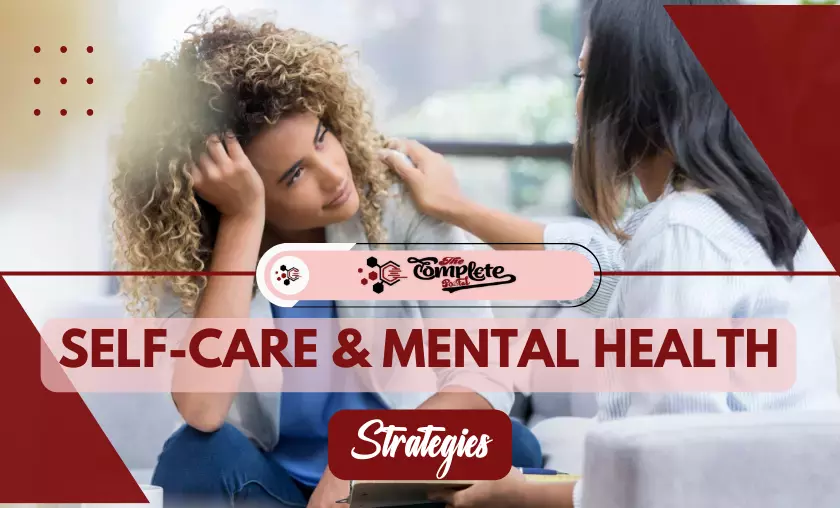
Self-care and mental health are closely intertwined aspects of overall well-being. This involves practices and strategies that prioritize and nurture your mental and emotional health. It’s about taking deliberate steps to maintain a healthy state of mind, manage stress, and build resilience in the face of life’s challenges.
In this guide, we’ll explore various self-care and mental health strategies that can empower you to lead a fulfilling and emotionally balanced life. From mindfulness and relaxation techniques to seeking support when needed, these practices can contribute to improved mental and emotional resilience.
Self-care and Mental Health
Why It’s Important
Self-care encompasses a wide spectrum of activities and practices aimed at nurturing your physical, emotional, and mental well-being. It involves everything from the basics, like getting enough sleep and maintaining a healthy diet, to more mindful practices like meditation, yoga, and spending time in nature.
Self-care is also about setting boundaries, saying no when necessary, and prioritizing your needs without guilt. It’s a holistic approach to taking care of yourself, recognizing that a healthy body and mind are interconnected. By understanding what self-care entails and customizing it to your unique needs, you can lead a more balanced and fulfilling life.
No More Negative Self-Talk
Self-care and Mental Health
Often, without realizing it, as you navigate your daily routine, there’s a critical inner voice evaluating your actions. While this voice can sometimes offer constructive feedback, it can be detrimental to your mental well-being when it becomes excessively negative.
Negative self-talk can erode your confidence, diminish your happiness, and impede your progress toward achieving your goals. So, how can you prevent this from happening? To start, pay attention when you catch yourself engaging in self-deprecating thoughts. If you frequently use terms like “always” or “never,” such as “I always ruin my relationships” or “I’ll never find a job,” you’re trapping yourself in a harmful mindset.
Replace these destructive thoughts with positive affirmations like “I’m continually learning from my relationships” and “I possess valuable qualities as a job candidate.” Over time, you’ll gain better control over these negative comments and learn to treat yourself with kindness.
Take Care of Your Body
Self-care and Mental Health
Research indicates that maintaining a regular exercise regimen is closely tied to cultivating a stronger physique and a healthier mental state. Exercise plays a pivotal role in sharpening your cognitive abilities, alleviating stress, and diminishing the risk of age-related mental decline. If you’ve been inactive for an extended period and unsure where to begin, fret not. There are online fitness blogs that can guide you in gradually incorporating physical activity into your daily routine.
Ensure you nourish your body with balanced meals, stay adequately hydrated, and prioritize sufficient sleep to provide your body with the necessary sustenance and vitality for effective workouts. Don’t procrastinate; your body and mind will express gratitude for your efforts.
Take a Step Outdoors
Self-care and Mental Health
Whether it’s a brief ten-minute stroll through your neighborhood or a challenging hike up a mountain, immersing yourself in nature offers profound advantages for your mental well-being. This straightforward self-care approach can effectively clear your mind and provide a sense of stability.
The next time you find yourself overwhelmed, contemplate taking a leisurely walk in a nearby park. Strive to allocate time outside your home or apartment each day. Even uncomplicated activities like savoring your morning coffee in the backyard or delving into a good book on your balcony can yield noticeable improvements in your mental health.
Take a Break from Screens
Self-care and Mental Health
Electronic devices have become integral to our daily existence, and indispensable for work, education, communication, and leisure. However, research has uncovered that excessive screen time can contribute to feelings of depression.
Excessive indulgence in activities like binge-watching, gaming, and endless social media scrolling often results in isolation, sedentary behavior, and detachment from reality. Notably, social media platforms can magnify sensations of loneliness and inadequacy.
Therefore, another valuable self-care recommendation for nurturing your mental well-being involves dedicating a portion of each day to set aside your device, disengage from the digital realm, and reconnect with the tangible world around you.
Get or Explore Different Hobbies
Self-care and Mental Health
For those juggling full-time work or school commitments along with daily personal and family responsibilities, the idea of cultivating a hobby may seem like the last thing on your mind. However, it’s precisely individuals with overwhelming schedules who stand to benefit the most from adopting hobbies.
Prioritizing self-care involves carving out time for yourself to explore your passions and embrace new hobbies. Hobbies can encompass a wide range of activities, such as drawing, hiking, gardening, learning to cook new recipes, or exploring art galleries.
Shifting your focus towards something enjoyable can alleviate stress and provide you with a rejuvenated perspective when returning to your daily responsibilities. Keep in mind that you can achieve success in your professional or educational pursuits without denying yourself the pleasures of fulfilling activities.
Enjoy Moments
Self-care and Mental Health
Frequently, we encounter the advice to embrace the present moment. While it may sound ideal in theory, it can be challenging to follow when we’re consumed by past regrets or preoccupied with future worries. The key lies in recognizing that we cannot alter the past, and tomorrow’s certainty is uncertain, so it’s worthwhile to channel our energy into the here and now.
Although it may seem cliché, the practice of grounding oneself in the present offers numerous advantages. Finding gratitude in small moments can enhance your overall mood and encourage a positive outlook regardless of your circumstances. When you concentrate on the immediate task at hand, you improve your skillfulness, fortify your relationships, and even the most daunting projects and deadlines become less intimidating.
Start Saying “Yes”
Self-care and Mental Health
Fear wields considerable influence over our emotions, but it doesn’t need to dictate the course of your life. Begin by embracing “yes” as your response to new experiences and challenge yourself to venture beyond your comfort zone. Saying “yes” more often isn’t about agreeing to things you don’t desire; rather, it’s about refusing to allow fear to hinder you from pursuing your long-held aspirations.
Frequently, we grapple with various fears, such as the fear of failure, judgment, or the unknown. Embracing a “yes” mindset is a potent self-care strategy that can bolster your inner resilience and help you surmount any doubts holding you back. Therefore, if you find yourself contemplating a dream, such as embarking on a new career path or penning a novel, seize the moment to challenge yourself.
Start Saying “No”
Self-care and Mental Health
Recognizing when to decline is just as vital as embracing affirmative responses. Setting boundaries is essential to safeguarding your mental well-being, yet it can be challenging, particularly if you struggle to express your needs. If you habitually default to saying “yes,” you’re likely familiar with how swiftly situations can spiral out of control.
Before you realize it, you’ve committed to covering extra work shifts, running errands for neighbors, or hosting impromptu gatherings with friends without considering your desires. Although mastering this form of self-care may present difficulties, it is entirely attainable with persistent practice.
Connect With Someone You Love
Self-care and Mental Health
Maintaining connections with friends and family plays a vital role in enhancing your overall well-being. Research has revealed that feelings of isolation can contribute to a wide array of physical and psychological issues, encompassing sleep disturbances, obesity, substance misuse, and personality disorders. Tragically, individuals who experience isolation face a 50% greater risk of premature mortality compared to those with robust social bonds.
Whether your interactions with friends and family occur in person or through virtual means, these connections can elevate your spirits, boost your self-esteem, and keep you mutually engaged in one another’s lives. You’re never truly alone, and the act of reaching out to a friend or family member constitutes a priceless form of self-care.
Don’t Ignore Emotional Stressors
Self-care and Mental Health
Avoiding or suppressing the existence of a problem won’t make it vanish. Bottling up your emotions can lead to irritability, affect your ability to communicate effectively, and even strain your relationships. Therefore, when you experience feelings of sadness, anxiety, anger, or loneliness, it’s important not to disregard them.
Instead, strive to delve into the root of the issue. Ask yourself, “What is causing my distress? Can I take steps to address it?” Just as you wouldn’t ignore a fever but would take measures to address it and hasten your recovery, you should adopt a similar approach to your mental health.
Conclusion
The profound connection between self-care and mental health cannot be overstated. By prioritizing self-care practices such as mindfulness, stress reduction, and seeking professional support when needed, individuals can build resilience, manage daily pressures, and embark on a path toward mental and emotional wellness.
Remember that self-care is not a one-size-fits-all endeavor. It’s a deeply personal journey, and individuals should explore various self-care techniques to find what resonates best with them. By embracing self-care as an integral aspect of our lives, we empower ourselves to lead mentally healthy, fulfilling, and resilient lives.
FAQ’s
Is Self-care a Long-term Commitment, or Can It Be Occasional?
Self-care is most effective when it becomes a long-term commitment. While occasional self-care activities can provide temporary relief, consistent self-care practices integrated into your daily life can have a lasting and profound impact on your mental health and overall well-being.
How Can I Start Incorporating Self-care Into My Daily Routine?
To incorporate self-care into your daily routine, begin with small, manageable practices that you enjoy and that promote relaxation and emotional well-being. Create a schedule that includes these activities and gradually build on them as you prioritize your mental health.
Are There Different Types of Self-care Practices for Various Mental Health Concerns?
Yes, there are various self-care practices that can be tailored to address specific mental health concerns. For example, relaxation techniques may help with anxiety, while mood-tracking and journaling can benefit those with depression. It’s important to explore practices that align with your individual needs.
Can Self-care Replace Professional Mental Health Treatment?
Self-care is a valuable complement to professional mental health treatment but should not replace it. Individuals with mental health conditions should seek the guidance of mental health professionals who can provide tailored interventions, therapy, and medication when necessary.
Is Self-care the Same as Self-indulgence?
No, self-care is not the same as self-indulgence. Self-care involves intentional actions and practices aimed at nurturing physical, emotional, and mental well-being. It prioritizes self-preservation, self-compassion, and emotional balance, rather than excessive indulgence.
To Read More Similar Articles, Click Here.
Thanks for Visiting Our Website. If You Appreciate Our Work, Kindly Show Us Some Support in Our Comments Section 🙂





